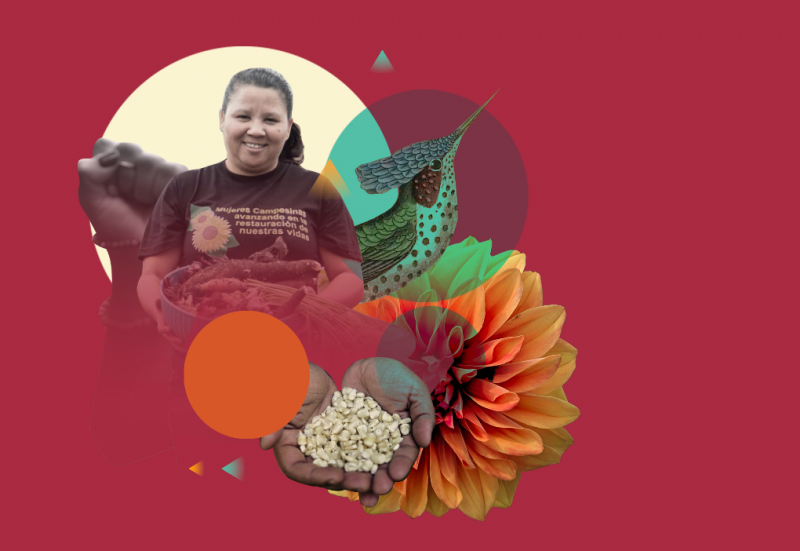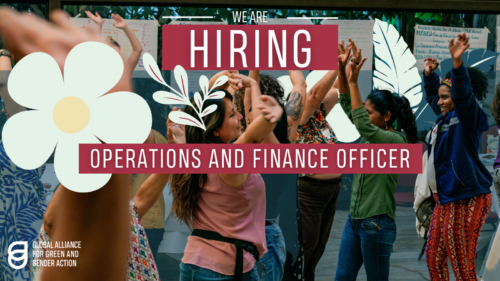We want to restore the lungs of the earth: Putting women at the helm of ecological restoration

We, the feministas campesinas, want to restore the lungs of the earth.
The COVID-19 pandemic is showing us the fragility of our food and agriculture systems, and how many farms have become industrial monocultures with palm oil and sugar cane, or are focused on the production of cash crops like coffee and cocoa. This has degraded the soil and destroyed native forest. As a result, local communities which were historically self-sufficient are now not able to feed themselves and suffer shortages of supplies. Many local communities, women and grassroots groups, are facing challenges that bring us to rethink resilience, food security and water issues.
Now is the time to rethink our systems with a holistic approach, and start promoting policies and practices that lead to the planet’s ecological stability, cultivating rich biodiversity in our forests and farms, and thus bringing us health through our food. Analog Forestry is such an approach.
It’s a way of restoring ecological systems by imitating natural forests but enriched with useful species such as fruit and nut trees, coffee, tea, cacao, avocado, and medicinal plants. It restores the water balance and generates income for the local community. Using Analog Forestry is a powerful weapon against climate change because it prevents deforestation, restores soils and increases biodiversity. This is essential to get healthy and resilient ecosystems that have a natural resistance to plagues, droughts and other climate change-related threats. These reclaimed and restored forests are air purifiers and large carbon sinks.
Analog Forestry is also a powerful tool against gender inequality; it is part of the feminist fight. In the conventional agrarian production system in the context of Nicaragua, women are no more than labor force, an object to be used. Analog Forestry for us is an opportunity to also get involved in the production of healthy food and to regain ownership over our own nourishment and health. It gives us more autonomy.
But it is not only technical. Analog Forestry – when it is being applied with a feminist perspective – can be part of the continuous feminist fight for land rights and the commons. Land is a common good that gives us power and that we need to live in dignity, so we need to fight for land titles, for access to and control over land.
The fact that I now manage land feels like a centuries-long system of inequality has been broken. I can now grow my own food. Not in the colonial way, where I exploit and exhaust the ground, but in a spiritual-ecological way. I can restore the historical connection that we Indigenous women have with the earth; her health is mine too. In fact, we are rebelling against a materialistic system of exploitation by building ourselves a system based on respect and harmony.
Two years after the Analog Forestry training, I already can harvest coffee, banana, passionfruit, sunflowers, different spices and vegetables, and next year I’ll have avocado too. I want to be an example for other women and other families, show them that more sustainable production is possible. I want to use my forest as a demonstration site, a place to learn and exchange experiences. I want to motivate other women, share my knowledge, promote food security and sovereignty, the use of medicinal plants, and restore water sources. I hope other families in my communities will join me and start their own Analog Forest.
Women are often denied the right to food sovereignty, water and a clean and safe living environment. By putting them at the helm of ecological restoration, you give them those rights. If the earth is healthy, then we are spiritually, physically and mentally healthy, too. Mother Earth empowers us women so that we become like the strong trees that you see from the air on our own plots of land.
Luz Marina Valle is a feminist farmer, trained as an engineer in agricultural and cooperative management. She is a member of the Fundacion Entre Mujeres (FEM) and a local promotor of Analog Forestry in her community of El Jocote in Northern Nicaragua. The International Analog Forestry Network is a partner of the Global Alliance for Green and Gender Action (GAGGA). You can learn more about their work here.
Hear directly from other Analog Forestry promoters from Ecuador, Ana María Andrade and Enma Revilla (in Spanish, see English transcript here).
You can also find this blog post in Bahasa Indonesia, French, Georgian, Hindi, Mongolian, Nepali, Portuguese, Spanish and Tagalog.
Featured image designed by @Naandeyeah and photo courtesy of Luz Marina Valle.

We Are Hiring: Operations and Finance Officer!
DEADLINE EXTENDED! Are you passionate about ensuring efficient financial management and operational excellence to support transformative work in climate, environmental,…

We Are Hiring: Donor Engagement Officer!
DEADLINE EXTENDED! Are you passionate about cultivating relationships and securing funding to support transformative work in climate, environmental, and gender…

Welcoming Anamika Dutt As GAGGA’s Planning, Monitoring, Evaluation & Learning (PMEL) Officer!
Anamika Dutt is a feminist MEL practitioner from India. Anamika believes that stories of change and impact are best heard…
Subscribe to our newsletter
Sign up and keep up to date with our network's collective fight for a gender and environmentally just world.
